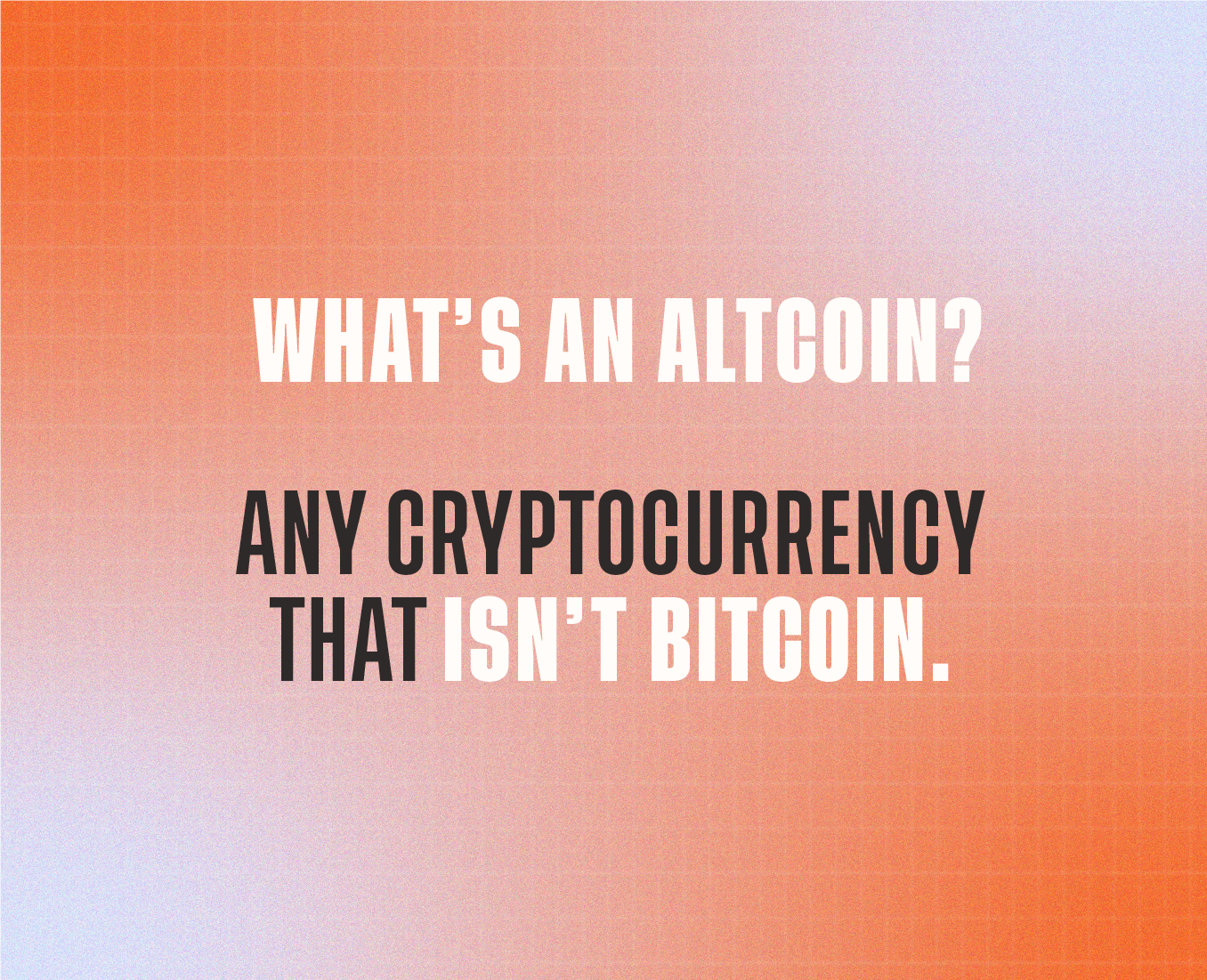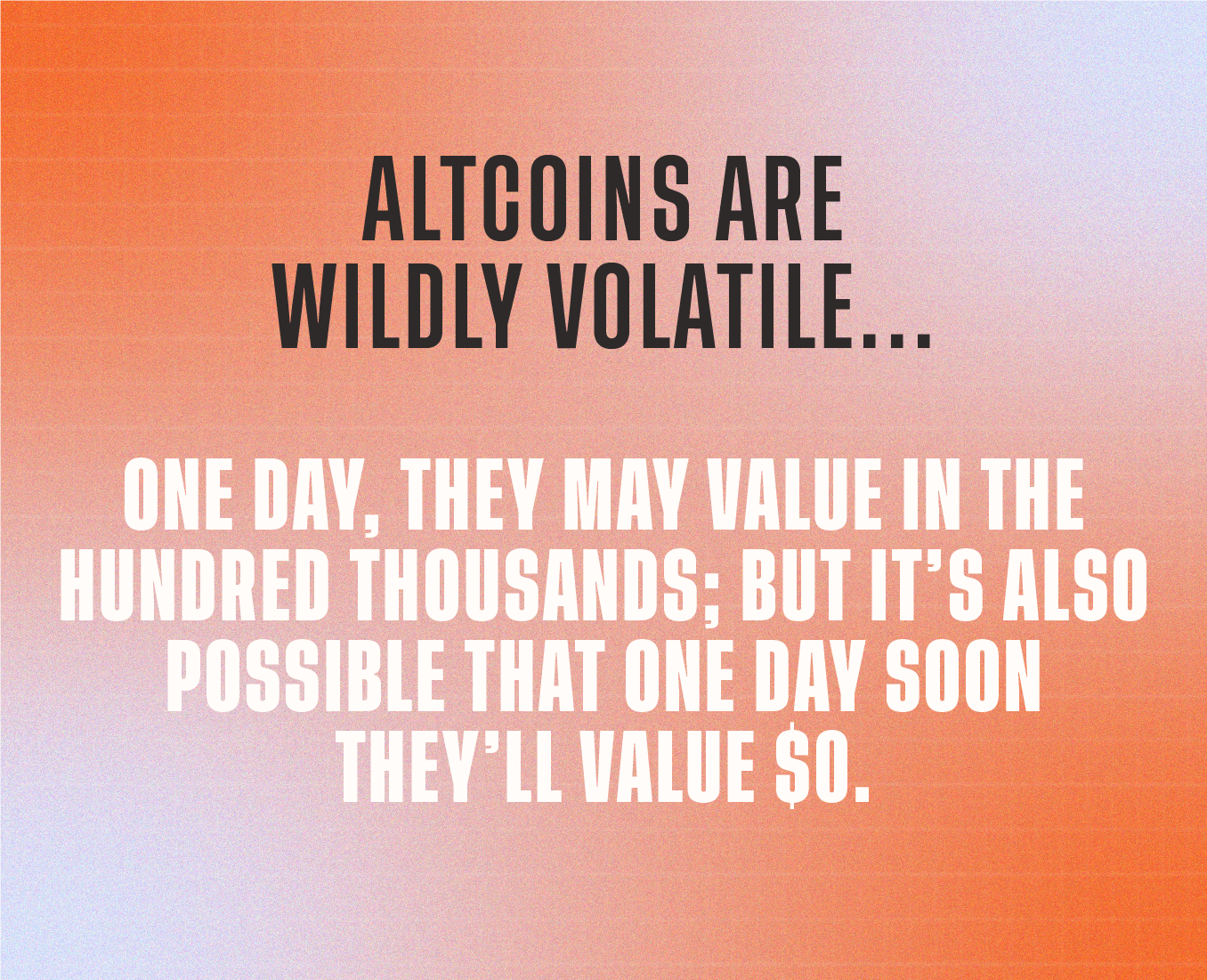Not all crypto is created equal
Bitcoin! Ethereum! Litecoin! Stellar! Chainlink! Peercoin! Binance Coin. Bitcoin Cash. Tether. Namecoin? Ripple… Dash. Neo, Cardano, Verge, Stellar. Titcoin (is what it sounds like, fyi). Dogecoin. Primecoin Auroracoin Monero Zcash EOS.IO. LMAO?
Every time bitcoin (BTC) accumulates lots of value in the market (which it has been, for months straight now!), everyone gets all bristly about the medium of cryptocurrency and looks for alternative crypto that might let them in on the ground floor.
This is understandable: if you’d bought $50 of BTC in the year it was first used in a transaction, 2010, you’d be a multi-multi millionaire today.¹ BTC was the miracle proof of concept that made a handful of folks very rich, and the rest of us very jealous.
So every time a comparable sort of crypto—one that appears to have the same explosive potential as BTC did—makes waves, ears prick up.
But let us tell ya, as we’ve told ya before: not all crypto is created equal. Here’s why! [cue theme music!]
What are Altcoins, or Alternative Cryptocurrencies?
It can’t be understated how groundbreaking bitcoin and its mechanisms were in 2010 (and continue to be today!). It was a first of its kind online financial system based not in trust but in the blockchain, and it sought to invest agency and autonomy in users, not in big banks or federal governments.
We all know that bitcoin was extremely volatile in its early days. It remains a speculative asset, but today, there is widespread acceptance of its longevity. Bitcoin, it seems, is here to stay.
And it has brought friends. The altcoins.

Yep: bitcoin is so massive in the world of crypto that all other cryptocurrencies can be weighted against it as a type. Bitcoins and altcoins. But not all are made equally.
How Do Altcoins Work?
Bitcoin operates in a fixed system: 21 million coins in total will be produced over the course of years, and all transactions are recorded in the blockchain. New bitcoin is produced about every ten minutes through mining.
Altcoins may retain the principle of the bitcoin system, but the specifics are very different. Some cryptocurrencies take only one or two minutes to produce new coins, and some have a much larger cap than 21 million. However, they’re all recorded in public ledgers using a blockchain to verify transactions.

As users of cryptocurrency, the premise is very similar. You can purchase altcoins just like you’d purchase bitcoin, and can trade altcoins for goods or services, or hold onto the altcoin in hopes of securing a capital gain if its value goes up.
Should I Invest in Altcoins?
Right about here is where we try to beat our lawyers to the punch by saying your investments are entirely personal and you must do your own research before investing in anything. Anything! This post is not intended as investment advice, it is purely informational and we can’t help you if you make an investment that tanks.
Anyways.
Lots of people are interested in altcoins right now and for good reason. As bitcoin climbs higher and higher, little frissions of activity crank the value of altcoins. Dogecoin, for example, has seen rallies off and on for most of 2021.
But does that mean you should invest in altcoins?
Not necessarily.
It’s exciting to get in at the ground floor of a technology like this. The prospect of making millions fast is irresistible to many of us. And the fact is that crypto is here to stay, and it does stand to reason that other altcoins may eventually see mainstream uptake like bitcoin has.

Bottom line: invest at your own risk.
Do Altcoins Matter?
So do alternate cryptocurrencies really matter? If they’re not as robust as bitcoin, are more volatile than bitcoin, and have a long way to go before they could become like bitcoin (which is still very volatile!)?
Yes! They do matter. Bitcoin is paving the way for a new kind of currency and all sorts of these altcoins will likely continue to have some kind of value going forward, especially as crypto becomes more mainstream.
The other cool thing? Altcoins can be used for stuff other than simply transferring value. Take solarcoin, for example. This altcoin is used as a unit of exchange for solar power production.
They say, “[o]ur goal and 40-year mission since 2014 is to incentivize solar electricity production by rewarding the generators to reduce the cost of electricity production.”
Their goal? To make solar power completely free.
“When the value and price of a SolarCoin exceed the production cost of the energy, it becomes effectively free – an event we call the Solarity,” they say.
So altcoins do matter because as a concept, they ain’t goin’ nowhere. Not all will function like bitcoin. But all will have new, exciting applications. And we’re here for it, y’all!
This blog post is provided for informational purposes only. It is not intended as investment advice and isn’t meant to suggest that a particular investment or strategy is suitable for any particular investor. If you’re unsure about an investment, you may wish to obtain investment advice from a qualified professional. Nothing herein should be considered an offer, solicitation of an offer, or advice to buy or sell securities. Buying and selling altcoins and bitcoin is risky and you may suffer losses. The price of altcoins and bitcoin is highly volatile and speculative. You should never invest more in altcoins and bitcoin than you can afford to lose. Past performance is no guarantee of future results. Always do your research and never invest more than you can afford to lose.
1 - The price of one single bitcoin in March 2010 was $0.0033CAD which means that $5CAD would’ve purchased 1,515 bitcoins. The approximate price of bitcoin on March 18, 2021 was $76,000 per bitcoin. That means that the value of 1,515 bitcoins on March 18, 2021 would’ve been $115,140,000. For more information on the historical pricing of bitcoin, see: https://www.investopedia.com/articles/forex/121815/bitcoins-price-history.asp